[Audio version on Spotify, or found here.]
This month, July 2024, marks the 60th anniversary of the passage of the Civil Rights Act of 1964, and in honor of Biden stepping down to make way for his DEI hire vice-president, I thought this would be the right time to talk about the Act. Whenever possible, I prefer to address the cause of a problem, not the symptom, and if the symptom is racial tension and the erosion of meritocracy and traditional values toward a neo-Marxist faux egalitarianism, as exemplified by the Diversity, Equity, and Inclusion movement, part of the cause is rooted in the Civil Rights act of 1964.
It’s a large, complicated topic of course: An in-depth examination or discussion of which would run many hundreds of pages or go on for hours. Instead, we will look at two cases that, to me, highlight the true nature of the Civil Rights Act in general, and the Title II portion of it – Public Accommodation – in particular.

There have been many Civil Rights acts over the years, going at least as far back as the Civil Rights act of 1866. But when people talk about the civil rights act today, they are usually referring to the Act of 1964, which started with John Kennedy and was pushed through with the help of Kennedy’s ghost by Lyndon Johnson. There were eleven titles or sections to the Act. All but two deal with Federal or State run programs and facilities. The two that do not are Title II: Public Accommodations and Title VII: Equal Employment Opportunity.
Title II deals solely with the individual and his or her business, and is our subject today. Here are the key points for our purposes (Abbreviated. Emphasis added for discussion purposes. The full text can be found here):
• “42 U.S.C. §2000a (a)All persons shall be entitled to the full and equal enjoyment of the goods, services, facilities, privileges, advantages, and accommodations of any place of public accommodation, as defined in this section, without discrimination on the ground of race, color, religion, or national origin.
• 42 U.S.C. §2000a(b) Each of the following establishments is a place of public accommodation within this title if its operations affect commerce...(2) any restaurant, cafeteria, lunchroom, lunch counter, soda fountain, or other facility principally engaged in selling food for consumption on the premises, including, but not limited to, any such facility located on the premises of any retail establishment; or any gasoline station.
• 42 U.S.C. § 2000a(c) The operations of an establishment affect commerce within the meaning of this title if … it serves or offers to serve interstate travelers or a substantial portion of the food which it serves or gasoline or other products which it sells, has moved in commerce…
• 42 U.S.C. § 2000a(e) The provisions of this title shall not apply to a private club...Gosh. Heady stuff. It sure makes it sound like they have outlawed discrimination in any public setting. But there is a problem: Congress only has the authority granted it under the Constitution, primarily in Article 1, Section 8, often referred to as the Enumerated Powers. Mostly Article 1, Section 8, consists of the sort of things you would expect a government to do: power to make money, power to tax, raising a militia, providing for a Navy, creation of a post office, etc. That sort of thing.
And then there is Clause 3, the Commerce Clause, which reads:
[The Congress shall have Power . . . ] To regulate Commerce with foreign Nations, and among the several States, and with the Indian Tribes; …
That’s it. That is the vaunted Commerce Clause. Seems reasonably innocent, straightforward, and simple: If you are going to have a Nation composed of several smaller entities, ie., States, then some central regulating authority in dealing with foreign nations makes sense to represent the common interests of all the States. A tariff, for example, does no good if it is enforced only in one State, and the next State down the coastline doesn’t have one. Likewise, it makes sense in regards to trade between the States where coordination of waterway navigation laws, licensing, and other particulars would be important. (We’ll leave off on the Indian Tribes part of it for now).
But, can you see the not-so-subtle blank check Congress gave itself: “[Power] to regulate Commerce.” In other words, anything that touched upon “Commerce” in any way was open for Congressional control.
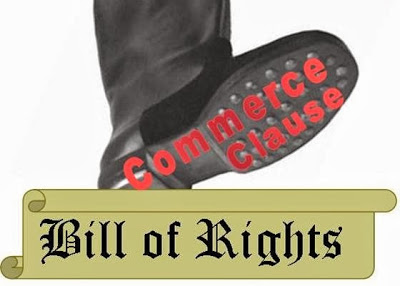
What, you may be asking, does this have to do with civil rights?
When devising the Civil Rights Act legislation, Congress quickly realized they did not, in fact, have the authority to tell private individuals who they could and could not discriminate against in the course of running their private lives and businesses. It is not in the scope of their Enumerated Powers.
But Commerce is.
Using the Commerce clause gave them the authority they needed to enact their social agenda. And they hammered this home almost immediately after the Act was passed. There were several cases brought to the Federal courts in the aftermath of the Act passing. Two of my favorites are Heart of Atlanta Motel, Inc. v. United States Et All, and Daniel v. Paul 1969.
In the first case, the Heart of Atlanta was a resort motel owned by Moreton Rolleston. It was different from what we think of when we visualize a motel today. Back then, it really was a motor hotel. Keeping in mind this was 1964, when air-conditioning was an expensive option for automobiles and a luxury for homes, party-lines were still common for phones (for you youngsters, a party line was a shared line among many users offering no privacy, not a line for coordinating parties), and eating out instead of cooking at home was a special event. The Heart of Atlanta Resort Motel featured 216 rooms with direct dial phones and it’s own switchboard, air conditioning in every room, 2 pools, a restaurant, lounge, a children’s playground and a barber shop.
They also catered to White guests only.
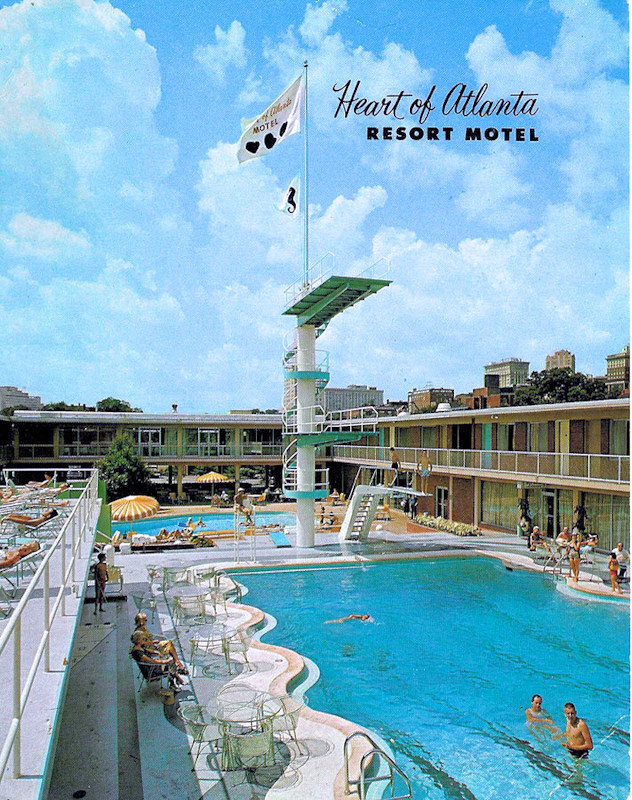
Upon passage of the Civil Rights Act, Rolleston immediately filed suit in federal court, contending that the law overreached the authority granted Congress in the Commerce Clause. He argued 1) that people themselves are not commerce; rather, people engage in commerce. Therefore, a hotel or motel does not necessarily engage in interstate commerce because the profit comes from persons rather than goods; 2) that racial discrimination by an individual is not prohibited by the Fourteenth Amendment or the Constitution, claiming that discrimination is a “private wrong” that individuals are allowed to commit; 3) he maintained that it violated his Fifth Amendment rights to choose customers and operate his business as he wished and resulted in unjust deprivation of his property without due process of law and just compensation; and 4) he argued that Congress had placed him in a position of involuntary servitude by forcing him to rent available rooms to African Americans, thereby violating his Thirteenth Amendment rights.
The United States District Court for the Northern District of Georgia ruled in favor of the United States and issued a permanent injunction requiring the Heart of Atlanta Motel, Inc. to refrain from using racial discrimination when providing services or goods to guests or the general public on its premises. Appealed to the Supreme Court, the Government again ruled in its own favor upholding the injunction. The essence of their argument was that discriminating against Black motorists could impact interstate commerce, because it placed an undue burden on their finding accommodation while traveling.
No mention is made why, in true capitalist fashion, a Black entrepreneur, identifying a need for goods or services could not avail himself of the opportunity and open a similar business that catered to Black clientele. Guess it was easier to force the White man to accept Black customers.
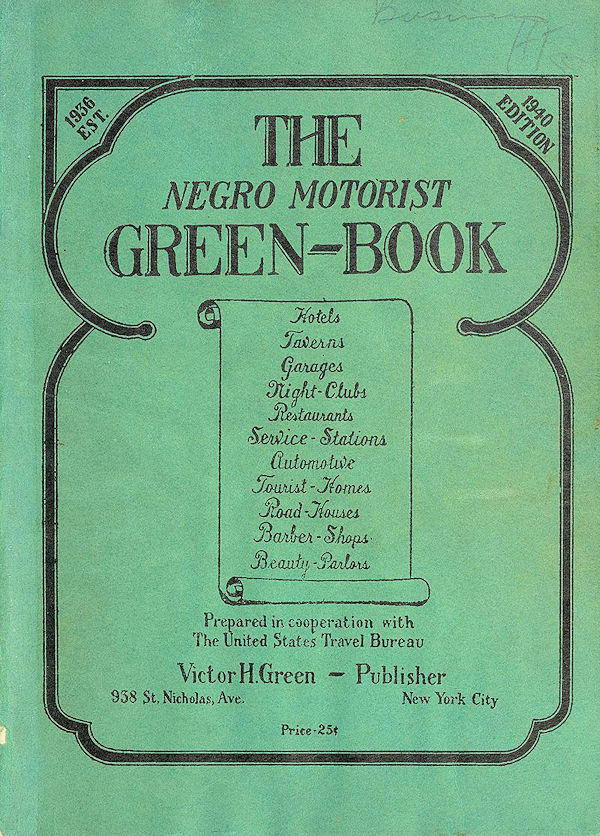
My favorite case, however, is Daniel v. Paul from 1969. It’s pretty simple in its absurdity:
The Lake Nixon Club in Arkansas was a Whites only private club on the north shore of the lake. The south side of the lake was in its natural state at the time and completely accessible to the general public. The lake itself, and the Club, were far removed from the interstate freeway and reachable only by an unpaved country road, making it difficult to see how it could have any impact on interstate commerce whatsoever.
Operated by Euell Paul and his wife, the Lake Nixon Club charged a modest membership fee and additional fees for use of club facilities. Amenities included paddle-boats for rent, a snack bar with a juke box, miniature golf, and dancing.
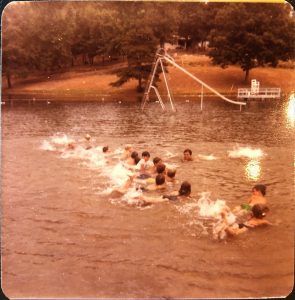
Naturally, in 1966, they were sued in federal court by two Blacks who wanted to use the facilities.
Respondent’s answer to an interrogatory why Negroes were refused admission was: “[w]e refused admission to them because white people in our community would not patronize us if we admitted Negroes to the swimming pool. Our business would be ruined and we have our entire life savings in it.”
At first, the federal courts ruled in favor of Mr. Paul and the Lake Nixon Club, finding that although they did discriminate on the basis of race, because they were a private club and not a place of public accommodation, they were not subject to the provisions of Title II of the Civil Rights Act.
Up to the Supreme Court it went, where they overruled the lower courts and ordered the Club open to all races. How could they do this? By gaming the Commerce Act, they decided that the Lake Nixon Club was not, in fact, a private club because:
- The paddle boats used by the Club were leased from an out-of-state company (even though they were made locally).
- The Club’s juke box was manufactured outside Arkansas and played records manufactured outside the State.
- Though the snack bar had limited options — hot dogs and hamburgers on buns, soft drinks, and milk – the “principal ingredients going into the bread were produced and processed in other States” and that “certain ingredients [of the soft drinks] were probably obtained from out-of State sources.”
Yes, the so-called Supreme Court ruled in favor of the the plaintiffs and Title II of the Civil Rights Act in part because the ingredients in the hot dog buns came from out of state.
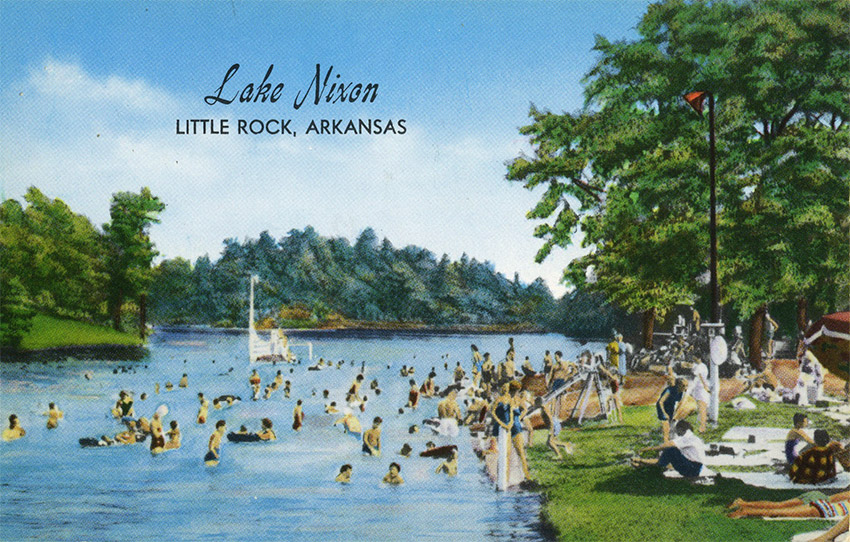
One judge (the ironically named Hugo Black from Alabama) dissented, stating:
“It seems clear to me that neither the paddle boats nor the locally leased juke box is sufficient to justify a holding that the operation of Lake Nixon affects interstate commerce within the meaning of the Act. While it is the duty of courts to enforce this important Act, we are not called on to hold nor should we hold subject to that Act this country people’s recreation center, lying in what may be, so far as we know, a little “sleepy hollow” between Arkansas hills miles away from any interstate highway. This would be stretching the Commerce Clause so as to give the Federal Government complete control over every little remote country place of recreation in every nook and cranny of every precinct and county in every one of the 50 States. “
So, the Supreme Court overturned two lower courts, ruled for the plaintiffs, and Negros got to go swimming with the White folks and buy their hamburgers and hot dogs.

For all the moralizing and holier-than-thou attitudes we have been subject to over the last 60 years, and especially the DEI/Alphabet People narrative forced down our throats in the last 15, the vaunted Civil Rights Act of 1964 rests heavily on legal trickery, semantic shenanigans, and idiotic interpretations of common sense facts. Why? Because it was the only way the so-called Liberals could win the day for their agenda: 66% of White Southerners disapproved of the Act, only 24% approved, and the rest were undecided. 40% of White Northerners disapproved of it too, or were undecided. This was by no means a societal consensus.
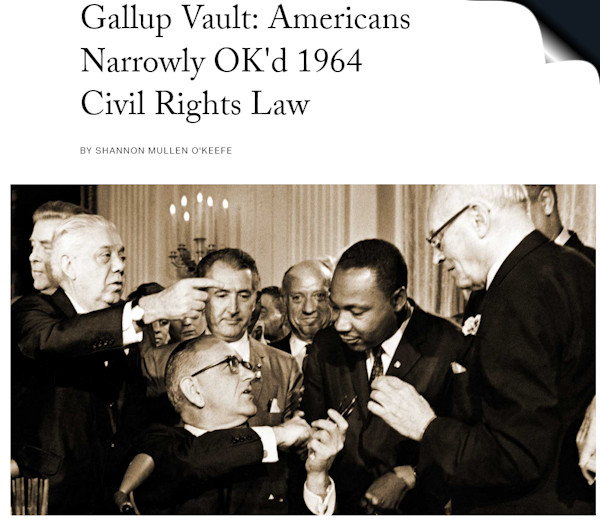
But by skirting the original intent of the Enumerated Powers and twisting the otherwise remarkably simple Commerce Act, the nanny-state liberals and their congressional lap poodles were able to pull on an important thread in the fabric of our nation. Less the “Great Society” and more the beginning of the Great Unraveling.
What the communist Left does not understand is that no amount of legislation and abuse of power will change peoples minds or attitudes. It does just the opposite: if their goal is some utopian vision of racial harmony and peaceful co-existence, then that needs to happen naturally, over time, if such a thing is actually possible. Forcing integration and criminalizing personal preference does nothing but create more division, animosity, and contempt, especially when they take something as simple as the Commerce Clause and twist it for their agenda of nefarious social engineering.
Amerika Erwache!

sources:
https://supreme.justia.com/cases/federal/us/395/298/
https://supreme.justia.com/cases/federal/us/379/241/
https://www.justice.gov/crt/title-ii-civhts-act-public-accommodationsil-rig
https://en.wikipedia.org/wiki/Heart_of_Atlanta_Motel,_Inc._v._United_States
https://en.wikipedia.org/wiki/Commerce_Clause
https://crdl.usg.edu/events/heart_atl_pickrick_trial/
https://caselaw.findlaw.com/court/us-supreme-court/395/298.html
https://constitution.congress.gov/constitution/

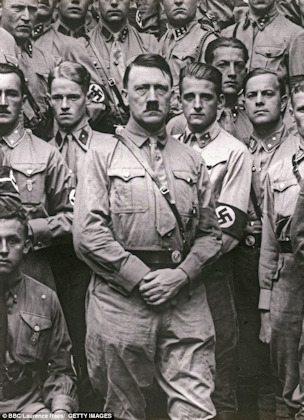
Leave a Reply